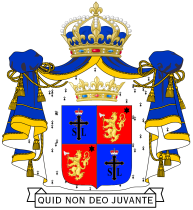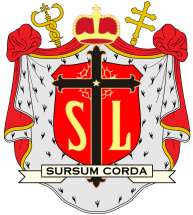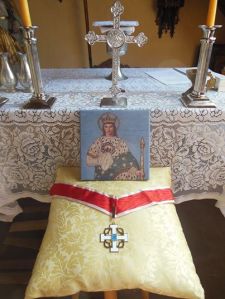 The Abbey-Principality of San Luigi is an international Christian religious organization, originally founded in 1883 as a sovereign theocratic principality in the Fezzan. Within an overall humane and charitable ethos, the Abbey-Principality carries out its mission today through churches, religious orders, nobiliary, chivalric and scholarly institutions.
The Abbey-Principality of San Luigi is an international Christian religious organization, originally founded in 1883 as a sovereign theocratic principality in the Fezzan. Within an overall humane and charitable ethos, the Abbey-Principality carries out its mission today through churches, religious orders, nobiliary, chivalric and scholarly institutions.
The Abbey-Principality is a church in its own right, led by the Prince-Abbot of San Luigi who is its Archbishop. In the spirit of ecumenism, it has over the years also absorbed other churches and religious orders leading to an international ministerial outreach, which is organized under the federation of the Catholicate of the West.
Background
 The name of the Abbey-Principality commemorates St Louis, King of France (1214-70), and continues several medieval traditions connected with the Knights Templar and the Crown of Thorns. It was established by a group of Catholic Benedictine monks as a self-governing sovereign religious principality in the Fezzan in 1883 and ruled there for eleven months. In 1884, the Abbey was overthrown and the Prince-Abbot murdered. The remaining monks came to the Bunyoro-Kitara Kingdom (today part of Uganda) where the Abbey-Principality was re-established and the new Prince-Abbot was granted the additional chiefly title of Mukungu (Prince-Governor). After the end of this second establishment in 1888, the title of Prince-Abbot passed to successors in France and the United States.
The name of the Abbey-Principality commemorates St Louis, King of France (1214-70), and continues several medieval traditions connected with the Knights Templar and the Crown of Thorns. It was established by a group of Catholic Benedictine monks as a self-governing sovereign religious principality in the Fezzan in 1883 and ruled there for eleven months. In 1884, the Abbey was overthrown and the Prince-Abbot murdered. The remaining monks came to the Bunyoro-Kitara Kingdom (today part of Uganda) where the Abbey-Principality was re-established and the new Prince-Abbot was granted the additional chiefly title of Mukungu (Prince-Governor). After the end of this second establishment in 1888, the title of Prince-Abbot passed to successors in France and the United States.
 The designation Abbey-Principality, once prevalent within the Roman Catholic Church along with that of prince-bishop, reflects the fact that in the Fezzan, the Prince-Abbot exercised temporal power as a sovereign prince over its abbey and surrounding area. Today, having been exiled from its former lands (which were subsequently incorporated into present-day Libya), the Abbey-Principality no longer has responsibility for territorial governance, but continues to hold the jus honorum deriving from its former sovereign status as well as preserving for its head the rank of a Prince of the Church.
The designation Abbey-Principality, once prevalent within the Roman Catholic Church along with that of prince-bishop, reflects the fact that in the Fezzan, the Prince-Abbot exercised temporal power as a sovereign prince over its abbey and surrounding area. Today, having been exiled from its former lands (which were subsequently incorporated into present-day Libya), the Abbey-Principality no longer has responsibility for territorial governance, but continues to hold the jus honorum deriving from its former sovereign status as well as preserving for its head the rank of a Prince of the Church.
On 22 March 1962, the then-Prince de San Luigi was the recipient of Letters Patent issued by His late Majesty King Peter II of Yugoslavia. The King’s act recognized the status of the Prince de San Luigi and further appointed the Prince to the ranks of the Royal Yugoslav nobility. The King had in 1960 accepted the High Protectorship of the senior chivalric Order of the Abbey-Principality, the Order of the Crown of Thorns.

The eighth and present Prince-Abbot, and the sixth Mukungu, is the Most Reverend John Kersey (regnal name Edmond III), who succeeded in August 2011. He is a British educationalist, musician and clergyman. In 2015, the Prince-Abbot also succeeded his adoptive father Prince Kermit de Polanie-Patrikios as Head of the Royal House Polanie-Patrikios (dynastic heir to several of the Byzantine Roman Imperial Houses and to the earliest rulers of Poland), and as pretender to the throne of Belarus, uniting this administration with the Abbey-Principality. The historical and legal basis of the sovereignty of the Abbey-Principality and the Royal House Polanie-Patrikios is discussed here.
Churches and religious orders

The Abbey-Principality was in union with the Roman Catholic Church until 1929. Since that time, it has been in partial or imperfect communion with the Holy See (see Catechism of the Catholic Church (1992), 838 and 1271), because although it remains Catholic in faith and practice and preserves valid sacraments, as a body faithful to the Tradition of the Church it is not under papal jurisdiction. Nevertheless, the Abbey-Principality holds the office of the Pope in the highest regard and looks for ecumenical unity under his leadership. It has on many occasions affirmed its friendly relations with Rome and counts among its past members numerous clergy and faithful of the Roman Catholic Church. It looks to strengthen these links and to explore the possibility of closer co-operation in the future. It has responsibility for the Order of Corporate Reunion, which was established in 1874 to promote union between the Roman Catholic Church and the Church of England. The Abbey-Principality describes itself with the phrase: Orthodox in Faith, Catholic in Practice, and Anglican in outlook.
The Abbey-Principality also has close links with several of the Orthodox Churches. The Order of Antioch, one of the religious orders of the Abbey-Principality, recognizes the Malankara Orthodox Syrian Church as its principal parent body, that church having been responsible for the episcopal consecration of Prince-Abbot Joseph III (reigned 1899-1929) as Metropolitan of the Old Catholics in the United States in 1892. Today, the Order of Antioch is a member of the International Council of Community Churches, which is a member of the World Council of Churches, Churches Uniting in Christ and the National Council of the Churches of Christ in the USA.

A number of other religious bodies have been incorporated into the Abbey-Principality over the years. The Abbey-Principality formerly administered the American Council of Ecumenical Churches, a union of some twenty-eight institutions. In February 2015, the present Prince-Abbot became Primate and Presiding Bishop of the Apostolic Episcopal Church, a continuing Anglican jurisdiction that has been recognized by statute of the State of New York since 1932, and that since 1977 has been formally united with the Catholicate of the West, a reunion movement of the smaller sacramental churches established in 1944. The Catholicate of the West is now the ecumenical federation under which the churches and religious orders of the Abbey-Principality are organized. The principal bodies are the Apostolic Episcopal Church, the Byelorussian Patriarchate of St Andrew the First-Called Apostle, the Order of Antioch, and the Order of Corporate Reunion.
The religious affiliation of the Abbey-Principality is deliberately ecumenical. It seeks to promote a broad-minded unity across Catholicism (with a particular emphasis on Traditional or Old Catholicism), Western Orthodoxy and Continuing Anglicanism, emphasising their common aspects of faith and practice. At the same time, it preserves the different charisms of its ecclesiastical bodies through their adherence as apostolates. Currently, there is representation in Brazil, the United States, France, the United Kingdom and Scandinavia. The Abbey-Principality and its constituent churches also have a significant past and present involvement with Christian Esotericism.
Chivalric orders

The Abbey-Principality is responsible for two historic Chivalric Orders, the Sovereign, Chivalrous Nobiliary and Religious Order of the Crown of Thorns, and the Sovereign, Knightly and Noble Order of the Lion and the Black Cross, as well as for the Grand Prix Humanitaire de France et des Colonies (which is the Cross of Merit of the Order of the Crown of Thorns). A further group of Orders is attached to the Royal House Polanie-Patrikios.
 From 1960 onwards each Order was placed under a High Protector. In the case of the Order of the Crown of Thorns, this was the late King Peter II of Yugoslavia. The Order of the Lion and the Black Cross appointed as its High Protector the Crown Prince, now H.I.M. Emperor Emeritus Akihito of Japan. At the same time, the Order of Antioch appointed as its High Protector H.I.R.H. Prince Louis Ferdinand of Prussia, who died in 1994, since when this position has been vacant.
From 1960 onwards each Order was placed under a High Protector. In the case of the Order of the Crown of Thorns, this was the late King Peter II of Yugoslavia. The Order of the Lion and the Black Cross appointed as its High Protector the Crown Prince, now H.I.M. Emperor Emeritus Akihito of Japan. At the same time, the Order of Antioch appointed as its High Protector H.I.R.H. Prince Louis Ferdinand of Prussia, who died in 1994, since when this position has been vacant.
 In 2012, H.M. Rukirabasaija Agutamba Solomon Gafabusa Iguru I, the reigning Omukama of Bunyoro-Kitara, who is the grandson of Omukama Chwa II Kabalega, accepted an invitation from the present Prince-Abbot to become a Royal Patron of the Order of the Crown of Thorns and the Order of the Lion and the Black Cross. A bilateral Treaty on Friendly Relations and Co-operation between the Abbey-Principality and the Kingdom of Bunyoro-Kitara entered into force at the same time. His Majesty, exercising his powers as a sovereign fons honorum, granted the two San Luigi Orders new Royal Charters, whereupon they were placed under the Royal Protection of a reigning monarch whose kingdom extends to some 1.4 million souls.
In 2012, H.M. Rukirabasaija Agutamba Solomon Gafabusa Iguru I, the reigning Omukama of Bunyoro-Kitara, who is the grandson of Omukama Chwa II Kabalega, accepted an invitation from the present Prince-Abbot to become a Royal Patron of the Order of the Crown of Thorns and the Order of the Lion and the Black Cross. A bilateral Treaty on Friendly Relations and Co-operation between the Abbey-Principality and the Kingdom of Bunyoro-Kitara entered into force at the same time. His Majesty, exercising his powers as a sovereign fons honorum, granted the two San Luigi Orders new Royal Charters, whereupon they were placed under the Royal Protection of a reigning monarch whose kingdom extends to some 1.4 million souls.
The Orders, whose membership is international and ecumenical, exist to recognize achievement and service in defence of the Church, of humanity, or in philanthropic work. While the Order of the Crown of Thorns is restricted to Christians and the Order of Antioch to clergy, the Order of the Lion and the Black Cross admits members regardless of their faith.
The past membership of the San Luigi Orders includes several saints of the Orthodox Churches, bishops of the Orthodox churches and the Anglican Communion, heads of Royal Houses, a former President of the United States, and other notable personalities.
Scholarship
 The Abbey-Principality has responsibility for several educational institutions, which operate under the aegis of the Anglican Association of Colleges and Schools. These include the Western Orthodox University (founded 1945), which functions as a Christian educational and research institution. The University is authorized to grant degrees by the statutes of the State of Florida, USA, and is accredited by the Pontificia Accademia Tiberina in Rome. The other major educational institution of the Abbey-Principality is European-American University (founded 2003) which holds a Royal Charter of Incorporation from the Kingdom of Bunyoro-Kitara, Uganda, is registered as a private provider of higher education (as Ecole Supérieure Euro-Américaine) in France, and (as European-American University and Theological Seminary) is authorized to grant religious degrees by the statutes of the State of Florida, USA. EAU delivers programmes via a network of over twenty affiliated campuses in sub-Saharan Africa.
The Abbey-Principality has responsibility for several educational institutions, which operate under the aegis of the Anglican Association of Colleges and Schools. These include the Western Orthodox University (founded 1945), which functions as a Christian educational and research institution. The University is authorized to grant degrees by the statutes of the State of Florida, USA, and is accredited by the Pontificia Accademia Tiberina in Rome. The other major educational institution of the Abbey-Principality is European-American University (founded 2003) which holds a Royal Charter of Incorporation from the Kingdom of Bunyoro-Kitara, Uganda, is registered as a private provider of higher education (as Ecole Supérieure Euro-Américaine) in France, and (as European-American University and Theological Seminary) is authorized to grant religious degrees by the statutes of the State of Florida, USA. EAU delivers programmes via a network of over twenty affiliated campuses in sub-Saharan Africa.
In addition, the Abbey-Principality administers a heraldic college, the International College of Arms of the Noblesse (founded in 1925), and a learned society, the Institute of Arts and Letters, London.
Organization
The Abbey-Principality is legally represented through the San Luigi Charitable Trust and the nonprofit company limited by guarantee of the Order of Corporate Reunion registered in England and Wales, details of which are given on the Contact page, as well as through the nonprofit religious corporation sole of the Apostolic Episcopal Church in Hawaii, USA, and the nonprofit religious corporation of the Order of Corporate Reunion in California, USA.



You must be logged in to post a comment.